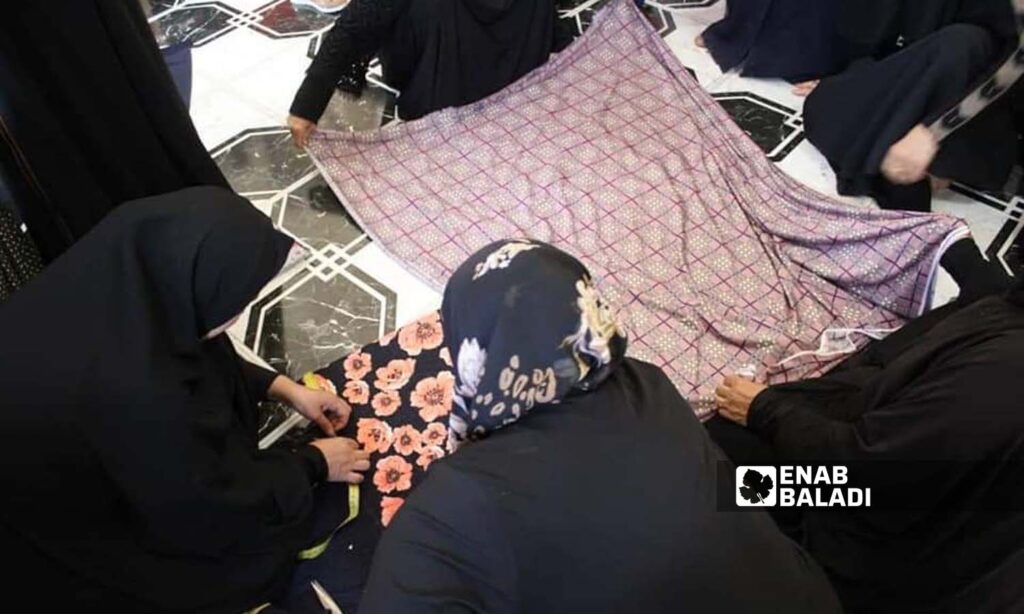Idlib – Huda al-Kulaib
At the age of 33, Alia al-Hazani decided to learn and work in sewing to face the difficult circumstances of her life amid the challenges and difficulties of displacement, poverty, and lack of opportunities.
Al-Hazani, an IDP from the town of Telmans and residing in the Harbanoush camps, north of Idlib city, told Enab Baladi that her husband rarely finds work, as he is a day laborer, and the wages he receives are low, and they are not at all commensurate with the long working hours and the high prices.
Al-Hazani learned the profession from the Women’s Empowerment Center in Idlib more than a year ago, after her last displacement, and invested her period of residence in her parents’ house, which was close to the center.
During the training course, which lasted about three months, Alia was able to get acquainted with the requirements of the profession and its various arts to gradually start work by purchasing a sewing machine and the profession’s supplies.
“In the beginning, I recycled the used clothes for my neighbors for free and considered it a trial period until I gained clients and developed my skills, which helped me move forward in the profession optimally,” she said.
Many women in the Idlib region tend to learn the profession of manual sewing, especially with the surge in the prices of clothes in the local markets, the harsh living conditions that plague them, in light of the decline in job opportunities, and the urgent need to find a financial return for most poor and displaced families.
As for Fadwa al-Ismail, 30, she enrolled in a sewing training course announced by an experienced seamstress in the town of Qah in return for a symbolic fee of 100 Turkish liras, which contributed to her gaining the profession within a period not exceeding a month.
Al-Ismail, who lives in very poor financial conditions, had her husband killed in the bombing of the city of Khan Sheikhoun by the Syrian regime and Russia before she was displaced from it following the military operation in 2019.
Fadwa’s difficult conditions, which began to turn from “bad to worse,” forced her to find a quick solution in order to be able to provide for her three children and to secure the requirements they need for a decent living, she told Enab Baladi.
Many women who do not have any academic degrees or professional experience resort to sewing due to its simple capital compared to other professions, as is the case with al-Ismail, who says that she loves this profession and has always wanted to learn it since she was young.
Al-Ismail was able to buy a solar-powered sewing machine and some fabric after she sold her last gold item.
Al-Ismail described the demand for sewing clothes by the women of the camp, located in Qah, north of Idlib, as “good,” especially with the unprecedented rise in the prices of ready-made clothes.
This is what made the sewing profession the focus of attention of many, and their goal as the only solution, as a result of its acceptable prices compared to the prices of ready-made clothes, the displaced women say.
Salwa al-Badawi, a tailoring trainer at the Women Empowerment Center in Idlib, advises all women who have been put into the breadwinner status by war conditions to learn professions in order to face the challenges that confront their daily living.
Al-Badawi told Enab Baladi that working in various professions would provide women with their various material needs and personal requirements and contribute to occupying their time with what is useful.
She added that work makes women self-reliant and does not ask for money from anyone, which is the most important factor in developing and strengthening women’s personalities and removing them from the stereotypical role that they have always been confined to within the family.
The trainer believes that the sewing profession is the most preferred among other professions for many due to its importance and ease of learning in a short time.
The sewing work “contributes to unleashing women’s ideas and creativity to make new designs, or to make modifications to clothes in an innovative way, and how to choose fabric and threads accurately, in addition to choosing the appropriate buttons and zippers,” says al-Badawi.
In addition to the fact that the sewing profession is a good source of livelihood, it is a wonderful hobby that pulsates with life and everything that is new, and its professionals feel a sense of accomplishment, she concluded.











